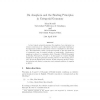Free Online Productivity Tools
i2Speak
i2Symbol
i2OCR
iTex2Img
iWeb2Print
iWeb2Shot
i2Type
iPdf2Split
iPdf2Merge
i2Bopomofo
i2Arabic
i2Style
i2Image
i2PDF
iLatex2Rtf
Sci2ools
128
click to vote
WOLLIC
2010
Springer
2010
Springer
On Anaphora and the Binding Principles in Categorial Grammar
In type logical categorial grammar the analysis of an expression is a resource-conscious proof. Anaphora represents a particular challenge to this approach in that the antecedent resource is multiplied in the semantics. This duplication, which corresponds logically to the structural rule of contraction, may be treated lexically or syntactically. Furthermore, anaphora is subject to constraints, which Chomsky (1981)[1] formulated as Binding Principles A, B, and C. In this paper we consider English anaphora in categorial grammar including reference to the binding principles. We invoke displacement calculus, modal categorial calculus, categorial calculus with limited contraction, and entertain addition of negation as failure.
Anaphora | Artificial Intelligence | Categorial Grammar | Logical Categorial Grammar | WOLLIC 2010 |
| Added | 11 Jul 2010 |
| Updated | 11 Jul 2010 |
| Type | Conference |
| Year | 2010 |
| Where | WOLLIC |
| Authors | Glyn Morrill, Oriol Valentín |
Comments (0)

